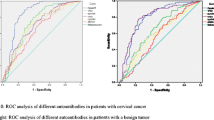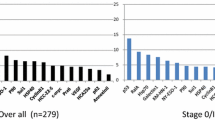Abstract
We aimed to evaluate the immunodiagnostic values of autoantibodies to a panel of six tumor-associated antigens (TAAs) in the detection of patients with breast cancer. This study determines whether a panel of multiple TAAs would enhance antibody detection and be a useful approach in breast cancer detection and diagnosis. The panel of multiple TAAs was composed of six TAAs including Imp1, p16, Koc, survivin, cyclin B1, and c-myc full-length recombinant proteins. Enzyme-linked immunosorbent assay (ELISA) was used to detect antibodies against these six TAAs in 49 sera from patients with breast cancer, 35 sera from patients with benign breast tumor, and 38 sera from normal individuals. Antibody frequency to any individual TAA in breast cancer was variable and ranged from 12.2 to 18.4 %. With the successive addition of TAAs to a final total of six antigens, there was a stepwise increase of positive antibody reactions reaching a sensitivity of 67.3 % and a specificity of 92.2 % in breast cancer. Positive and negative likelihood ratios were 8.52 and 0.36, respectively, which showed that the clinical diagnostic value of a parallel assay of six TAAs was high. Positive and negative predictive values were, respectively, 91.7 and 68.6 %, indicating that the parallel assay of six TAAs raised the diagnostic accuracy greatly. Agreement rate and kappa value were 78.1 % and 0.57, respectively, which indicated that the observed value of this assay had a middle range of coincidence with the actual value. The data from this study further support our previous hypothesis that the detection of autoantibodies for diagnosis of a certain type of cancer can be enhanced by using a panel of several carefully selected TAAs as target antigens and a panel of multiple TAAs would be a useful approach in the detection and diagnosis of breast cancer.


Similar content being viewed by others
References
Siegel R, Naishadham D, Jemal A. Cancer statistics. CA Cancer J Clin. 2013;63:11–30.
Tan EM. Autoantibodies as reporters identifying aberrant cellular mechanisms in tumorigenesis. J Clin Invest. 2001;108:1411–5.
Tan EM, Zhang J. Autoantibodies to tumor-associated antigens: reporters from the immune system. Immunol Rev. 2008;222:328–40.
Old LJ, Chen YT. New paths in human cancer serology. J Exp Med. 1998;187:1163–7.
Zhang JY, Chan EKL, Peng XX, Tan EM. A novel cytoplasmic protein with RNA-binding motifs is an autoantigen in human hepatocellular carcinoma. J Exp Med. 1999;189:1101–10.
Nielsen J, Christiansen J, Lykke-Andersen J, Johnsen AH, Wewer UM, Nielsen FC. A family of insulin-like growth factor II mRNA-binding proteins represses translation in late development. Mol Cell Biol. 1999;19:1262–70.
Muller-Pillasch F, Lacher U, Wallrapp C, Micha A, Zimmerhackl F, Hameister H, et al. Cloning of a gene highly overexpressed in cancer coding for a novel KH-domain containing protein. Oncogene. 1997;14:2729–33.
Crawford LV, Pim DC, Bulbrook RD. Detection of antibodies against the cellular protein p53 in sera from patients with breast cancer. Int J Cancer. 1982;30:403–8.
Soussi T. p53 antibodies in the sera of patients with various types of cancer: a review. Cancer Res. 2000;60:1777–88.
Covini G, Chan EK, Nishioka M, Morshed SA, Reed SI, Tan EM. Immune response to cyclinB1 in hepatocellular carcinoma. Hepatology. 1997;25:75–80.
Ambrosini G, Adida C, Altieri DC. A novel anti-apoptosis gene, survivin, expressed in cancer and lymphoma. Nat Med. 1997;3:917–21.
Yamamoto A, Shimizu E, Takeuchi E, Houchi H, Doi H, Bando H, et al. Infrequent presence of anti-c-Myc antibodies and absence of c-Myc oncoprotein in sera from lung cancer patients. Oncology. 1999;56:129–33.
Zhang JY, Casiano CA, Peng XX, Koziol JA, Chan EKL, Tan EM. Enhancement of antibody detection in cancer using panel of recombinant tumor-associated antigens. Cancer Epidemiol Biomarkers Prev. 2003;12:136–43.
Zhang JY, Megliorino R, Peng XX, Tan EM, Chen Y, Chan EKL. Antibody detection using tumor-associated antigen mini-array in immunodiagnosing human hepatocellular carcinoma. J Hepatol. 2007;46:107–14.
Chen Y, Zhou Y, Qiu S, Wang K, Liu S, Peng XX, et al. Autoantibodies to tumor-associated antigens combined with abnormal alpha-fetoprotein enhance immunodiagnosis of hepatocellular carcinoma. Cancer Lett. 2010;289:32–9.
Dai L, Ren P, Liu M, Imai H, Tan EM, Zhang JY. Using immunomic approach to enhance tumor-associated autoantibody detection in diagnosis of hepatocellular carcinoma. Clin Immunol. 2014;152:127–39.
Gordis L. Assessing the validity and reliability of diagnostic and screening tests. In: Gordis L, editor. Epidemiology. 2nd ed. Philadelphia: Saunders; 2000. p. 63–81.
Chen WQ, Zheng RS, Zeng HM, Zhang SW, Li GL, Wu LY, et al. Incidence and mortality of breast cancer in China, 2008. Thorac Cancer. 2013;4:59–65.
Zeng H, Zheng R, Zhang S, Zou X, Chen W. Incidence and mortality of female breast cancer in China, 2009. Thorac Cancer. 2013;4:400–4.
Anderson KS, LaBaer J. The sentinel within: exploiting the immune system for cancer biomarkers. J Proteome Res. 2005;4:1123–33.
Zhang JY, Tan EM. Autoantibodies to tumor-associated antigens as diagnostic biomarkers in hepatocellular carcinoma and other solid tumors. Expert Rev Mol Diagn. 2010;10:321–8.
Acknowledgments
The authors thank Dr. Eng M. Tan (The Scripps Research Institute) for his support. This work was supported by a grant (SC1CA166016) from the National Institutes of Health (NIH). We also thank the Border Biological Research Center (BBRC) Core Facilities at The University of Texas at El Paso (UTEP) for their support, which were funded by an NIH grant (5G12MD007592).
Conflicts of interest
None
Author information
Authors and Affiliations
Corresponding authors
Rights and permissions
About this article
Cite this article
Liu, W., De La Torre, I.G., Gutiérrez-Rivera, M.C. et al. Detection of autoantibodies to multiple tumor-associated antigens (TAAs) in the immunodiagnosis of breast cancer. Tumor Biol. 36, 1307–1312 (2015). https://doi.org/10.1007/s13277-014-2756-5
Received:
Accepted:
Published:
Issue Date:
DOI: https://doi.org/10.1007/s13277-014-2756-5




